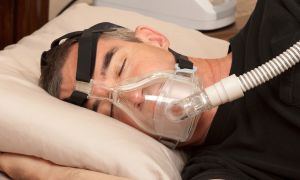Advertisement
An apnea monitor is a portable machine that monitors breathing and heart rate during sleep. It may be recommended for use in babies, particularly premature infants, who have been diagnosed with apnea (pauses in breathing during sleep). The apnea monitor comes equipped with electrodes and/or a belt that attaches to a baby's chest or stomach. When the baby's breathing and/or heart rate dip below normal, it triggers an alarm on the monitor. The device may also be referred to as an apnea and bradycardia or A/B monitor. Home apnea monitors are not used as often now because they can frequently cause false alarms, and because treatment of apnea in the hospital has improved over the years.
Apnea monitors are also made for adults who are at risk of respiratory failure from sleep apnea. These may measure breaths and changes in breathing pressure, presence of carbon dioxide in breaths, and motion during sleep, among other data, and sound an alarm if the adult's breathing pauses too long.
Apnea monitors are also made for adults who are at risk of respiratory failure from sleep apnea. These may measure breaths and changes in breathing pressure, presence of carbon dioxide in breaths, and motion during sleep, among other data, and sound an alarm if the adult's breathing pauses too long.
An apnea monitor tracks breathing and heartrate. Apnea is when an individual stops breathing. A home apnea monitor for a baby tracks a baby's breathing and heart rate.
Continue Learning about Sleep Apnea
Important: This content reflects information from various individuals and organizations and may offer alternative or opposing points of view. It should not be used for medical advice, diagnosis or treatment. As always, you should consult with your healthcare provider about your specific health needs.



